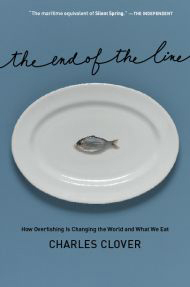The End of the Line: How Overfishing Is Changing the World and What We Eat
 |
|
| Language | English |
|---|---|
| Subject | Fishing, Environment |
| Genre | Non-fiction |
| Publisher | Ebury Press (UK) New Press (US) |
|
Publication date
|
2004 (UK) 2006 (US) |
| ISBN | (UK; Hardcover 1st ed.) ISBN (US; Hardcover 1st ed.) ISBN (UK; 2005 rev. ed.) ISBN (US; 2008 reprint, 1st ed.) |
| OCLC | 56083896 |
The End of the Line: How Overfishing Is Changing the World and What We Eat is a book by journalist Charles Clover about overfishing. Clover, a former environment editor of the Daily Telegraph (London) and now a columnist on the Sunday Times (London), describes how modern fishing is destroying ocean ecosystems. He concludes that current worldwide fish consumption is unsustainable. The book provides details about overfishing in many of the world's critical ocean habitats, such as the New England fishing grounds, west African coastlines, the European North Atlantic fishing grounds, and the ocean around Japan. The book concludes with suggestions on how the nations of the world could engage in sustainable ocean fishing.
Fishing is occurring at an unsustainable rate. Technological advances, political indecisiveness, and commercial interests in the fishing industry have produced a culture where fish stocks are being exploited beyond their capacity to regenerate. Commercial fish may become extinct within our lifetimes.
Official figures of global fish stocks have been wrong for several years. The United Nations Food and Agricultural Organization reported that the amount of wild fish caught had increased from 44 million tons in 1950, to 88 million tons in 1990, to 104 million tons in 2000. These figures were official even though the FAO knew they were false, that the catch was actually decreasing. In 1997, the Grand Banks cod fisheries of Newfoundland, Canada, had collapsed. 75% of all fisheries were either fully exploited or overfished.
Critically endangered species of fish are still allowed to be fished. For example, the bluefin tuna’s stock is equivalent to the black rhino. However, it is still being illegally caught and sold. Furthermore, there is even an oversupply problem in the current market as technological innovations have allowed entire schools of bluefin tuna to be caught at the same time. In Spain, the catch of bluefish tuna has exponentially decreased: 5000 million tons in 1999, 2000 million tons in 2000, 900 million tons in 2005.
Developed countries are exploiting the fishing stocks of developing countries. In West Africa, fishing agreements are made with European, American, and Asian fleets because money is needed to build basic infrastructure like schools and hospitals. This comes at the expense of their own local fishing industry which operates at a much less industrialised level, even though much of their local economy is sustained by fisheries. Widespread corruption within developing countries allows many agreements to be flaunted.
...
Wikipedia
